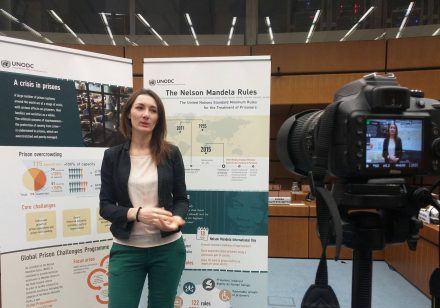PRI joins penal reform leaders to discuss prison-based rehabilitation

Photo: Miranda Merkviladze, PRI representative, giving a press interview at the meeting.
PRI joined a three-day meeting convened by United Nations Office on Drugs and Crime (UNODC) in Vienna on 23-25 January 2017 to discuss the promotion of prison rehabilitation and reintegration.
Experts from a number of regions and civil society representatives shared experiences and viewpoints on the challenges and practices with prison rehabilitation. Delegates reviewed a draft of the UNODC ‘Roadmap on Prison-based Rehabilitation programmes’, which will guide national authorities on how to initiate, enhance and manage rehabilitation activities in prisons.
While rehabilitation covers a wide variety of activities in different areas, such as medical and psychological treatment, cognitive-behavioural programmes, etc., the publication’s focus is on education, vocational training and work-related programmes for prisoners. The Nelson Mandela Rules explicitly highlight that the primary purposes of a sentence of imprisonment – the protection of society from crime – can only be met if the period of imprisonment is itself used to assist in this cause.
UNODC’s Deputy Executive Director, Aldo Lale-Demoz opened the meeting, noting:
“Many offenders are confronted by an extensive range of challenges which – if not addressed during their sentences – tend to worsen in the course of imprisonment, and could in fact develop into serious obstacles to their social integration. In too many parts of the world, high rates of re-offending illustrate that for many offenders, imprisonment has had little or no impact in promoting their desistance from crime.”
Participants shared experience from their respective countries. Singapore’s delegate presented a success story of the Yellow Ribbon Project which entails mobilising the community to engage in rehabilitation of ex-offenders to help them reintegrate into society, through rehabilitation initiatives by means of media advertising and digital outreach, mass campaigning (events of mass outreach), ground canvassing (corporations, schools, workplaces). A delegate from Italy introduced a concept of recruitment of prisoners by outside enterprises, which is regulated by law establishing the social cooperatives in Italy. The social cooperatives have a mutual aid character and act in the general interest of the community, but with entrepreneurial instruments and criteria.
The meeting was convened by the Justice Section of UNODC in the context of its Global Programme on the Implementation of the Doha Declaration. See more on the meeting on UNODC’s website.